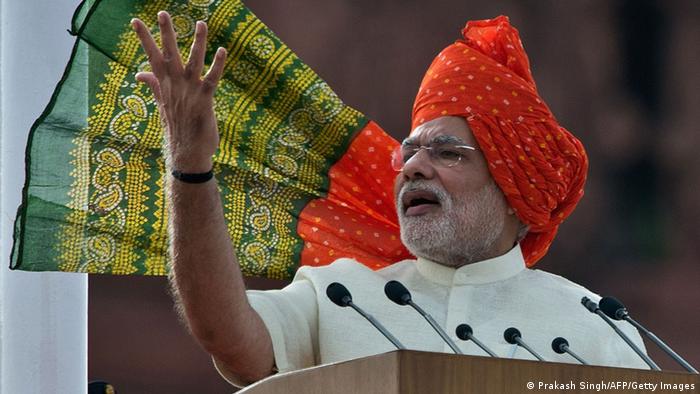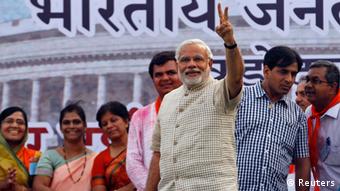Narendra Modi's 'lackluster' first 100 days as Indian premier
Narendra Modi swept into office on pledges of reviving a foundering economy. But analysts give the Indian PM mixed marks for his economic policies during his first 100 days in office. DW examines.
"When I became prime minister, there were high expectations. Not just high expectations, but people expected speed in decisions," Modi said on September 1 during a five-day trip to Japan."I give you the assurance that what we have done in the past 100 days, the results will be seen very quickly."
Expectations for the Indian PM are indeed high. After presiding over 12 years of strong economic growth as chief minister of the western Indian state of Gujarat, Modi and his Hindu-nationalist Bharatiya Janata Party (BJP) swept to power with a strong mandate in the April-May elections on promises to transform India's troubled economy and replicate the politician's record of economic success on the national stage.
But has the PM been able to lay the foundations for strong economic growth during his first 100 days in office? Analysts give the PM mixed marks.
Milan Vaishnav, expert in political economy at the Carnegie Endowment for International Peace, says that Modi's performance so far needs to be divided into two distinct components: improving the quality of governance and administration at the national level, and pursuing smarter economic policies. "In his first 100 days, Modi made headway on the former but disappointed on the latter," he told DW.
Improving accountability
In terms of administration, the analyst points out that Modi has reduced the number of layers in decision-making at the center, dissolved several cabinet committees with dubious or overlapping mandates, cracked the whip on the New Delhi bureaucracy and spoken out about his willingness to curb venality in government.
The Indian leader has also made strong anti-corruption statements during recent weeks indicating that his government will give a high priority to fighting graft. As a result, there have been local reports signaling a change of attitude among government officials who seem to take their jobs and responsibilities more seriously, spurred on in part by late night calls from the prime minister's office.
The Modi-led government even recently announced that the council of ministers would be judged and be given grades, according to their performance. "These steps alone will have a positive impact on the economic situation," said Vaishnav.
Economic policies
However, as the expert points out, while administrative tinkering may boost short-term growth and provide greater certainty to investors, it does not change the fundamentals: "In order to regain the high growth rates experienced in the mid-2000s on a sustained basis, there is no escaping major policy reform," Vaishnav explained.
But the new government has not yet introduced major transformational economic reforms during its first 100 days, leading analysts to speak of a "lackluster start." According to Mark Williams and Daniel Martin from the UK-based economic research consultancy Capital Economics, hopes that Modi would make a concerted early push on economic policy reform have not been fulfilled. "Of greater concern, the new government has given no sign that it is prepared to use its strong electoral mandate to push through controversial but necessary reforms," said the experts in an August 25 report.
For many years, successive Indian governments were unable to pursue major reforms because they did not have a parliamentary majority and were thus forced to work with coalition partners who blocked many key proposals. As a result, the general public and businesses were very dissatisfied with the weak economic performance during the last years of the previous Congress-led administration. As the BJP won an overall majority in India's parliament, there were widespread expectations that the incoming government would seize the opportunity to implement some major reforms.
A pro-growth budget?
But while the BJP's first national budget - presented on July 10 - promised a return to faster economic growth, an expansion of foreign investment in key industries, and fiscal discipline, analysts are of the view that it not only failed to outline the steps the government would take to meet these objectives, but also lacked major reforms and consisted mainly of many smaller measures.
"The opportunity to make bold reforms such as cutting corporate tax or reducing key subsidies was passed up," Rajiv Biswas, Asia-Pacific Chief Economist at the analytics firm IHS, told DW. "Notably the government failed to withdraw a retrospective corporate tax rule that had been heavily criticized by foreign multinationals and even by the BJP when they were in opposition, showing a rather timid approach to implementing reforms," the expert added.
Positive steps
But there have been positive aspects as well. Modi's landslide electoral victory in itself has led to an upturn in confidence and spurred business activity. "Auto sales and manufacturing production more broadly have picked up, showing modest positive growth during the last three months after showing zero growth for the last financial year," said Biswas.



No comments:
Post a Comment